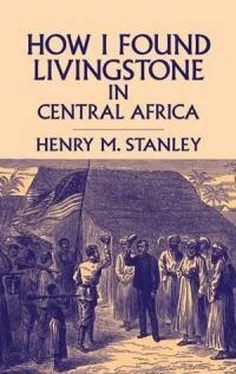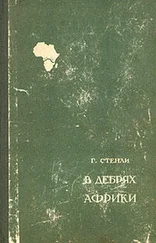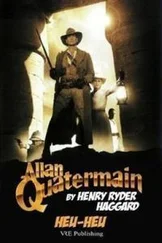Генри Стенли - How I Found Livingstone
Здесь есть возможность читать онлайн «Генри Стенли - How I Found Livingstone» весь текст электронной книги совершенно бесплатно (целиком полную версию без сокращений). В некоторых случаях можно слушать аудио, скачать через торрент в формате fb2 и присутствует краткое содержание. Год выпуска: 1872, Жанр: Биографии и Мемуары, на английском языке. Описание произведения, (предисловие) а так же отзывы посетителей доступны на портале библиотеки ЛибКат.
- Название:How I Found Livingstone
- Автор:
- Жанр:
- Год:1872
- ISBN:нет данных
- Рейтинг книги:5 / 5. Голосов: 1
-
Избранное:Добавить в избранное
- Отзывы:
-
Ваша оценка:
- 100
- 1
- 2
- 3
- 4
- 5
How I Found Livingstone: краткое содержание, описание и аннотация
Предлагаем к чтению аннотацию, описание, краткое содержание или предисловие (зависит от того, что написал сам автор книги «How I Found Livingstone»). Если вы не нашли необходимую информацию о книге — напишите в комментариях, мы постараемся отыскать её.
How I Found Livingstone — читать онлайн бесплатно полную книгу (весь текст) целиком
Ниже представлен текст книги, разбитый по страницам. Система сохранения места последней прочитанной страницы, позволяет с удобством читать онлайн бесплатно книгу «How I Found Livingstone», без необходимости каждый раз заново искать на чём Вы остановились. Поставьте закладку, и сможете в любой момент перейти на страницу, на которой закончили чтение.
Интервал:
Закладка:
Leaving Kulabi, we traversed a naked, red, loamy plain, over which the wind from the heights of Usagara, now rising a bluish-black jumble of mountains in our front, howled most fearfully. With clear, keen, incisive force, the terrible blasts seemed to penetrate through an through our bodies, as though we were but filmy gauze. Manfully battling against this mighty "peppo "- storm-we passed through Mukamwa's, and crossing a broad sandy bed of a stream, we entered the territory of Mvumi, the last tribute-levying chief of Ugogo.
The 4th of April, after sending Bombay and my friendly Mgogo with eight doti, or thirty-two yards of cloth, as a farewell tribute to the Sultan, we struck off through the jungle, and in five hours we were on the borders of the wilderness of "Marenga Mkali"-the "hard," bitter or brackish, water.
From our camp I despatched three men to Zanzibar with letters to the American Consul, and telegraphic despatches for the `Herald,' with a request to the Consul that he would send the men back with a small case or two containing such luxuries as hungry, worn-out, and mildewed men would appreciate. The three messengers were charged not to halt for anything-rain or no rain, river or inundation-as if they did not hurry up we should catch them before they reached the coast. With a fervent "Inshallah, bana," they departed.
On the 5th, with a loud, vigorous, cheery "Hurrah!" we plunged into the depths of the wilderness, which, with its eternal silence and solitude, was far preferable to the jarring, inharmonious discord of the villages of the Wagogo. For nine hours we held on our way, starting with noisy shouts the fierce rhinoceros, the timid quagga, and the herds of antelopes which crowd the jungles of this broad salina. On the 7th, amid a pelting rain, we entered Mpwapwa, where my Scotch assistant, Farquhar, died. We had performed the extraordinary march of 338 English statute miles from the 14th of March to the 7th of April, or within twenty-four days, inclusive of halts, which was a little over fourteen miles a day.
Leukole, the chief of Mpwapwa, with whom I left Farquhar, gave the following account of the death of the latter:-
"The white man seemed to be improving after you left him, until the, fifth day, when, while attempting to rise and walk out of his tent, he fell back; from that minute he got worse and worse, and in the afternoon he died, like one going to sleep. His legs and abdomen had swollen considerably, and something, I think, broke within him when he fell, for he cried out like a man who was very much hurt, and his servant said, `The master says he is dying.'
"We had him carried out under a large tree, and after covering him with leaves, there left him. His servant took possession of his things, his rifle, clothes, and blanket, and moved off to the tembe of a Mnyamwezi, near Kisokweh, where he lived for three months, when he also died. Before he died he sold his master's rifle to an Arab going to Unyanyembe for ten doti (forty yards of cloth). That is all I know about it."
He subsequently showed me the hollow into which the dead body of Farquhar was thrown, but I could not find a vestige of his bones, though we looked sharply about that we might make a decent grave for them. Before we left Unyanyembe fifty men were employed two days carrying rocks, with which I built up a solid enduring pile around Shaw's grave eight feet long and five feet broad, which Dr. Livingstone said would last hundreds of years, as the grave of the first white man who died in Unyamwezi. But though we could not discover any remains of the unfortunate Farquhar, we collected a large quantity of stones, and managed to raise a mound near the banks of the stream to commemorate the spot where his body was laid.
It was not until we had entered the valley of the Mukondokwa River that we experienced anything like privation or hardship from the Masika. Here the torrents thundered and roared; the river was a mighty brown flood, sweeping downward with, an almost resistless flow. The banks were brimful, and broad nullahs were full of water, and the fields were inundated, and still the rain came surging down in a shower, that warned us of what we might expect during our transit of the sea-coast region. Still we urged our steps onward like men to whom every moment was precious-as if a deluge was overtaking us. Three times we crossed this awful flood at the fords by means of ropes tied to trees from bank to bank, and arrived at Kadetamare on the 11th, a most miserable, most woe-begone set of human beings; and camped on a hill opposite Mount Kibwe, which rose on the right of the river-one of the tallest peaks of the range.
On the 12th of April, after six hours of the weariest march I had ever undergone, we arrived at the mouth of the Mukondokwa Pass, out of which the river debouches into the Plain of Makata. We knew that it was an unusual season, for the condition of the country, though bad enough the year before, was as nothing compared to this year. Close to the edge of the foaming, angry flood lay our route, dipping down frequently into deep ditches, wherein we found ourselves sometimes up to the waist in water, and sometimes up to the throat. Urgent necessity impelled us onward, lest we might have to camp at one of these villages until the end of the monsoon rains; so we kept on, over marshy bottoms, up to the knees in mire, under jungly tunnels dripping with wet, then into sloughs arm-pit deep. Every channel seemed filled to overflowing, yet down the rain poured, beating the surface of the river into yellowish foam, pelting us until we were almost breathless. Half a day's battling against such difficulties brought us, after crossing the river, once again to the dismal village of Mvumi.
We passed the night fighting swarms of black and voracious mosquitoes, and in heroic endeavours to win repose in sleep, in which we were partly successful, owing to the utter weariness of our bodies.
On the 13th we struck out of the village of Mvumi. It had rained the whole night, and the morning brought no cessation. Mile after mile we traversed, over fields covered by the inundation, until we came to a branch river-side once again, where the river was narrow, and too deep to ford in the middle. We proceeded to cut a tree down, and so contrived that it should fall right across the stream. Over this fallen tree the men, bestriding it, cautiously moved before them their bales and boxes; but one young fellow, Rojab-through over-zeal, or in sheer madness-took up the Doctor's box which contained his letters and Journal of his discoveries on his head, and started into the river. I had been the first to arrive on the opposite bank, in order to superintend the crossing; when I caught sight of this man walking in the river with the most precious box of all on his head. Suddenly he fell into a deep hole, and the man and box went almost out of sight, while I was in an agony at the fate which threatened the despatches. Fortunately, he recovered himself and stood up, while I shouted to him, with a loaded revolver pointed at his head, "Look out! Drop that bog, and I'll shoot you."
All the men halted in their work while they gazed at their comrade who was thus imperilled by bullet and flood. The man himself seemed to regard the pistol with the greatest awe, and after a few desperate efforts succeeded in getting the box safely ashore. As the articles within were not damaged, Rojab escaped punishment, with a caution not to touch the bog again on any account, and it was transferred to the keeping of the sure-footed and perfect pagazi, Maganga.
From this stream, in about an hour, we came to the main river, but one look at its wild waters was enough. We worked hard to construct a raft, but after cutting down four trees and lashing the green logs together, and pushing them into the whirling current, we saw them sink like lead. We then tied together all the strong rope in our possession, and made a line 180 feet long, with one end of which tied round his body, Chowpereh was sent across to lash it to a tree. He was carried far down the stream; but being an excellent swimmer, he succeeded in his attempt. The bales were lashed around the middle, and, heaved into the stream, were dragged through the river to the opposite bank, as well as the tent, and such things as could not be injured much by the water. Several of the men, as well as myself, were also dragged through the water; each of the boys being attended by the best swimmers; but when we came to the letter-boxes and valuables, we could suggest no means to take them over. Two camps were accordingly made, one on each side of the stream; the one on the bank which I had just left occupying an ant-hill of considerable height; while my party had to content itself with a flat, miry marsh. An embankment of soil, nearly a foot high, was thrown up in a circle thirty feet in diameter, in the centre of which my tent was pitched, and around it booths were erected.
Читать дальшеИнтервал:
Закладка:
Похожие книги на «How I Found Livingstone»
Представляем Вашему вниманию похожие книги на «How I Found Livingstone» списком для выбора. Мы отобрали схожую по названию и смыслу литературу в надежде предоставить читателям больше вариантов отыскать новые, интересные, ещё непрочитанные произведения.
Обсуждение, отзывы о книге «How I Found Livingstone» и просто собственные мнения читателей. Оставьте ваши комментарии, напишите, что Вы думаете о произведении, его смысле или главных героях. Укажите что конкретно понравилось, а что нет, и почему Вы так считаете.












